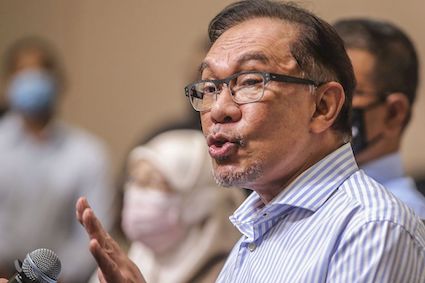Anwar faces biggest test in latest comeback as PM candidate

Siva Selan, Malaysia Now
The national context is no longer the same as it was during GE14, while Anwar himself faces a different set of hurdles in his prime ministerial ambitions.
Pakatan Harapan’s (PH) choice of Anwar Ibrahim as its candidate for prime minister is no surprise to those who follow Malaysian politics, but comes this time around as the veteran politician is in his 70s, leading an opposition that is far from the united front through which it came to power three years ago.
Anwar has been a candidate for prime minister since the 1999 general election with the exception of 2018 when Dr Mahathir Mohamad was fielded instead.
But this would mark his first time leading a coalition without a political ban or a cloud of legal battles – at least not as of this month, when PH announced him as its PM candidate.
Anwar was first presented as a PM candidate in the 1999 general election, a year after he was booted out of the Barisan Nasional government where he had been groomed as the successor to Mahathir, the prime minister at the time.
As was the case in 1999, he now approaches a general election after missing his best chance to occupy the top post.
With more than four decades of experience in party politics, Anwar appears alone among his contemporaries in that he is yet to have tasted power in the seat of Putrajaya.
Over the years, Abdullah Badawi, Najib Razak and Muhyiddin Yassin, all of whom he served with in key Cabinet positions at one time or another, have occupied the top seat.
One analyst said PH has no leader other than Anwar as its rallying point.
“Although he is clouded with negative perceptions, he can still gain enough support compared to other leaders in PH. It’s the best choice PH has at the moment,” academic Azmi Hassan told MalaysiaNow.
While Azmi did not go into specifics on these negative perceptions, there has been growing criticism of the PKR leader’s recent gestures with Umno leaders such as Ahmad Zahid Hamidi and Najib, all three of whom are seen as aligned in their opposition to the Perikatan Nasional government.
The revelation of a phone conversation between Anwar and Zahid has raised further questions on how far the opposition leader will go to clinch the top post.
Still, Azmi is confident of Anwar’s ability to mobilise support from across the PH vote banks.
“It is the best choice for PH and maybe one of the better choices for the people when they go to the polls,” he added.
Hisommudin Bakar, whose think tank Ilham Centre has studied Malaysian voting trends over several general elections, agreed that naming Anwar as its PM candidate was the best move for PH.
But he added that issues facing PH, as well as the trend of support for the coalition, might not be the same as it was in 2018 when Najib’s 1MDB scandal and other matters held sway over the electorate.
“The level of support may not be as high as the last election,” Hisommudin said.
If the election proceeds amid the Covid-19 pandemic, he said, there would also be an impact on voter turnout.
Hisommudin said Anwar would still struggle for support in areas beyond constituencies dominated by the non-Malays.
Among the Malays, there is still strong resistance to Anwar as prime minister, he said.
He also noted that PH’s image had been battered by its failure to fulfil its election promises, such as for toll-free highways.
“They need to be careful this time and draft a doable manifesto, not just bring in populist elements to attract voters,” he said.
Hisommudin said Anwar’s charisma had also taken a beating from his persistent claims of having the necessary numbers, and what is seen as a fixation on the prime minister’s seat.
“Nominating a PM candidate alone will not have any major impact that will guarantee victory for PH in the next election,” he said.
He said failure by Anwar and PH to address this would be disastrous for the coalition, and, beyond that, could be the final nail in the coffin of Anwar’s PM ambitions.

